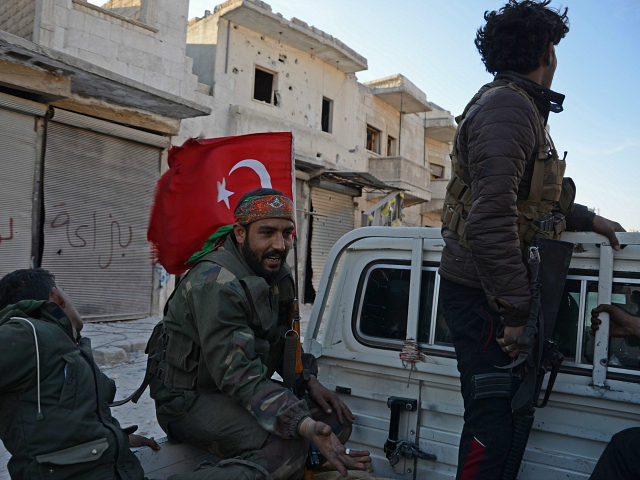American forces have clashed with Turkish-backed rebels in northern Syria, reports CNN, citing an unnamed military official with the U.S.-led coalition against the Islamic State (ISIS/ISIL).
The official indicated that “U.S. troops in northern Syria came under direct attack last week by Turkish-backed rebels,” adding that “while U.S. troops returned fire there were no casualties on either side.”
Acknowledging that Turkey has been supporting forces opposed to Syrian dictator Bashar al-Assad’s regime throughout the war, CNN notes that Turkey’s military was not involved in the recent assault against U.S. troops.
Nevertheless, the unnamed anti-ISIS coalition official told CNN that the U.S.-led alliance had officially lodged a diplomatic protest with Ankara after Turkish allies attacked American troops.
CNN describes the “Turkish-backed opposition forces” who allegedly opened fire on the United States military as “a loose grouping of Arab and Turkmen fighters that have helped the Turkish military clear ISIS from the Turkish-Syria border area.”
The Pentagon has indicated that U.S.-Turkey tensions have been mounting in Syria, confirming that it has lead to confrontations between groups backed by the two NATO allies.
“Recent incidents have occurred in [Syrian] territories primarily under the control of Turkish-backed fighters. We are engaged with Ankara and other parties to address this danger,” Eric Pahon, a Pentagon spokesman, told CNN.
“Coalition forces are there [in Syria] to monitor, deter hostilities and ensure all parties remain focused on our common enemy and the greatest threat to regional and world security, ISIS,” he stressed.
Echoing the Pentagon, British Maj. Gen. Rupert Jones, the deputy commander of the U.S.-led coalition, told Pentagon reporters last week that allied troops in Syria will not hesitate to exercise their “inherent right of self-defense,” conceding that they have come under attack by “some kind of opposition force.”
“We take appropriate measures to try and minimize the risk of those [confrontation] events happening. But they do happen, and of course, all coalition forces have the inherent right of self-defense at their disposal, should they feel the need,” declared Gen. Jones, noting that, “by and large, these de-confliction measures are serving us very well.”
In June, U.S. Marine Maj. Adrian Rankine-Galloway, a Pentagon spokesman, also noted that American-led coalition troops would protect themselves if necessary.
“The coalition’s mission is to defeat ISIS in Iraq and Syria,” Maj. Rankine-Galloway told Breitbart News. “The coalition presence in Syria addresses the imminent threat ISIS in Syria poses globally. The coalition does not seek to fight Syrian regime, Russian or pro-regime forces partnered with them, but is well prepared to defend itself from hostile threats if necessary.”
Although Turkey and the United States are both opposed to Assad and in favor of decimating ISIS as part of the international coalition, the two NATO allies currently find themselves on opposing sides of a conflict that has been brewing for months.
To the dismay of Ankara, the United States has been backing the Kurdish People’s Protection Units (YPG), the armed unit of the Kurdish Democratic Union Party (PYD) that controls large swathes of northern Syria.
The U.S. considers the YPG fighters to be a useful ally against ISIS, but Turkey accuses them of being the Syrian offshoot of the Kurdistan Workers Party (PKK), which has been deemed a terrorist organization by both Ankara and Washington.
YPG fighters have been clashing with Turkish-backed Syrian rebels and the Turkish military for months.
Currently, the United States armed forces are training and advising the Manbij Military Council, a group of local Arab fighters affiliated with the YPG-led Syrian Democratic Forces (SDF).
The U.S.-backed SDF, an Arab-Kurdish alliance, is fighting to liberate Raqqa, ISIS’s de-facto capital in Syria.
Despite the recent attacks, the U.S. troops are expected to remain in Syria, undeterred, according to the Pentagon.
“Coalition troops will continue performing patrols within the Manbij Military Council area of control,” Pahon, the Pentagon spokesman, told CNN.
Col. Ryan Dillon, a spokesman for the U.S.-led coalition, weeks ago, confirmed that attacks were being carried out against American troops in Syria, stresssing that the allied troops “reserve the right to defend ourselves.”

COMMENTS
Please let us know if you're having issues with commenting.